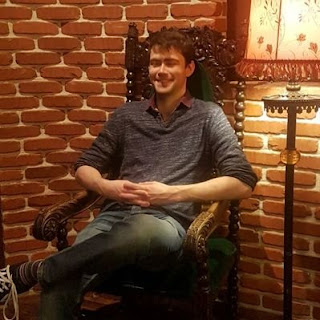This is one of the poems that are labeled “war poems” – which some people might want to rephrase in not-so-flattering terms – that appear on a web page for the western soldiers who are actively involved in the fighting in Afghanistan. War poems written by soldiers have a long tradition from Sophocles, Wilfred Owen, Sassoon, and so on …
· The introduction to the web page says that it attempts to show war “as not simply a physical thing but also a psychological experience ….[and that through their poetry soldiers] reveal their attitudes to civilians back home who may not understand or sympathies with the role they had been required to take on.” Reading these lines, I was reminded of the protests marches against the US invasion of Vietnam in the in the very hearts of western strongholds.
· Alex Cockers was born in April 1985 in England. He was a Royal Marines Commando from 2005-2009 and had served in Afghanistan for 14 months. Commenting on how he came to write his poems, he explains, "During my fourteen months in Afghanistan, I had many feelings and thoughts that I was unable to share with anyone. Under the stars; in the desert, rhymes would manifest in my head. I would write them down, construct them into poems and somehow I felt better for getting it off my chest." “Tom” was published in 2010 after he had left RMC.
· The poem has 5 quatrains with no discernable rhyming scheme possibly signaling the rigidity of military life as well as the meaningless of death. The title of the poem, while it could very well be the name of a fellow soldier of the poet, also stands as a sort of a generic appellation for all the surplus and thereby easily dispensable working class or lower middle-class young men sent to war by countries like the UK and the USA to further their neocolonialist agendas elsewhere in the world in the guise of establishing democracy. In addition, British soldiers are often called Tommie by their allies .
· Tom and the poetic persona were from the same place, they had attended the same school and later they had joined the Royal Marines Commandos together. They have a shared history which makes Tom’s loss more profound for the voice. The Corps of Royal Marines is an amphibious light infantry and also one of the five fighting arms of the Royal Navy of the United Kingdom
· The decision to join the RMC had been without regrets for both young men for they had “never looked back”. One usually looks back at something only if it has something better to offer in comparison to the present. Therefore, the phrase “never looked back” suggests a socioeconomic struggle the two men had been only too glad to have left behind. Later, the two had been shipped to the desert – separately, and their subsequent meeting during which they had “a laugh and a chat” in an unfamiliar place must have been a relief to both Tom and the voice. They go on a mission and the voice hears the death of his friend over the communication set: “I heard it over the radio” At this point he does not name the event as death: “I heard it over the radio,” he says. His unwillingness to accept the unpalatable truth underscores his unwillingness to name the happening as death.
·
Then in the next line he denies to himself that it was really his
own friend that had died.
· Once on a mission, one has to concentrate on the mission – any lapse in concentration would result in one’s own name being added to the list of casualties; so, he “chose to deny” his friend’s death until he “got back in” to the base. Upon returning, Drapes, possibly another soldier asks him “for a private word/ With a tear in his eye”. Here, we see a marine usually portrayed as the toughest of the tough with a tear in his eye. The voice is still in denial: he finds the entire experience absurd.
·
The word “absurd” lends itself to multiple readings: it could be
read as
o
What Drapes said was absurd
o
Or Drapes in tears was absurd
o
Or what the soldiers doing there was absurd
o
Or Tom being dead was absurd
o
Or war was absurd
o
Or life in general was absurd.
· Tom, another statistic on the long list of casualties of war, will be remembered by the voice forever, he says. But we know there is no such thing as forever, the voice very well could be another Tom the following day. They toast Tom’s life and call him “A soldier to the death” but such empty platitude fails to comfort them, so the remaining young men “cry and cry again.”They are mourning not only the life of their departed friend but also the fragility of their own lives.
· The poem is written in the first person and the language is simple and conversational. These invite a feeling intimacy between the poetic persona and the reader. Consequently, the reader is thrust into a position similar to that of a priest at a confessional cubical: the tough ex-marine is bearing his soul and letting us see his tears.


.jpg)


Thank you, I appreciate your words. This was about Tom Curry, he was my mate and the best of us all.
ReplyDeleteI lost someone dear to me as well whom I would also call the best of me. Stay safe
Delete